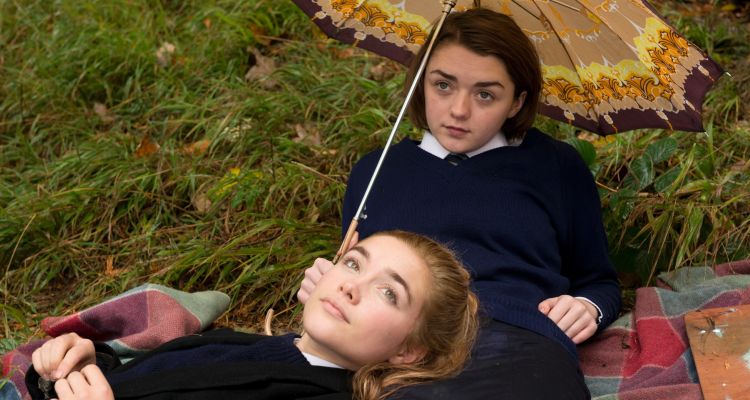 (5 / 5)
(5 / 5)
How do we categorize ambition in a film?
It has to mean more than scope or scale — Avengers: Age of Ultron is big and bold but what new does it attempt in terms of storytelling, apart from maybe giving Hawkeye something to do?
Director Ann Morley has previously explored both supernatural experiences and mass hysteria in short form, and though The Falling is only her second venture into dramatic features it deftly handles far grander and more universal themes.
Set at an all-girl’s school circa 1969, the film is inundated with shots of nature: a rippling brook, leaves both waxy and green, crisp and autumnal; a young couple having their first sexual encounter in the back of the boy’s car amidst the dappled trees.
The girl in question is Abbie (newcomer Florence Pugh), a charming, vivacious blonde and unlikely best friend to the dark-haired, witchy Lydia (Game of Thrones’ Maisie Williams), whose worldliness contrasts her own innocence.
The Falling is all about subtle contrasts, the counterbalance of light and dark, earth and water. While the public school setting is inherently masculine — it brings to mind If… without the automatic weaponry — the girls’ world is commanded by female figures: bitter, saggy-faced Miss Mantel (Greta Scacchi); brooch-wearing, chain-smoking headmistress Miss Alvaro (BAFTA winner Monica Dolan); young impressionable art teacher Miss Charron (Morfydd Clark).
Lydia is a self-proclaimed rationalist, an intense, level-headed presence who suggests gin and a knitting needle when Abbie comes to her with “a problem”. Abbie, meanwhile, is a scandalous sort of innocent, coming to terms with her own body and the scant presence of men in her life; even Lydia’s brother Kenneth (an intriguing, knowingly lechy Joe Cole) has his attraction.
Abbie’s parents remain unseen and Lydia own mother, Eileen (Maxine Peake) is a detached, wounded figure, whose trauma runs deeper than the absence of her husband.
When tragedy hits the school, Lydia becomes the focus of an epidemic of fainting fits, Their entranced writhing — utterly self-possessed, euphoric and transcendent — sends the teaching staff into barely concealed panic. Is it wilful misbehavior, hysteria, magic, a virus, or something else?
Flashes of nature, combined with Tracey Thorn’s soaring, melodic score, suggests that whatever is happening is also a sort of freedom, an escape from logic, order, the pain, conflict, and disappointment of real life.
One of The Falling’s most magical elements is that each character seems to have their own secret lives, from quiet, agreeable school prefect Susan (Ripper Street‘s Anna Burnett) silently coming into herself to Misses Mantel and Alvaro sharing a private bit of mirth.
While the final third feels more narrative than thematic, the The Falling‘s resonance and complexity, and uniformly magnificent performances, combine to make Morley’s film one of best British offerings of recent years.
